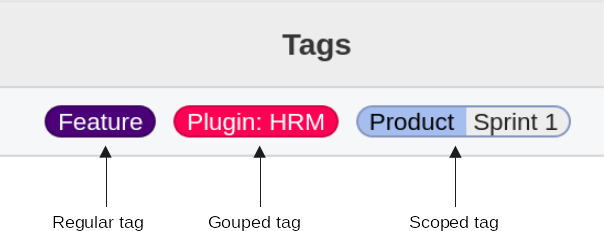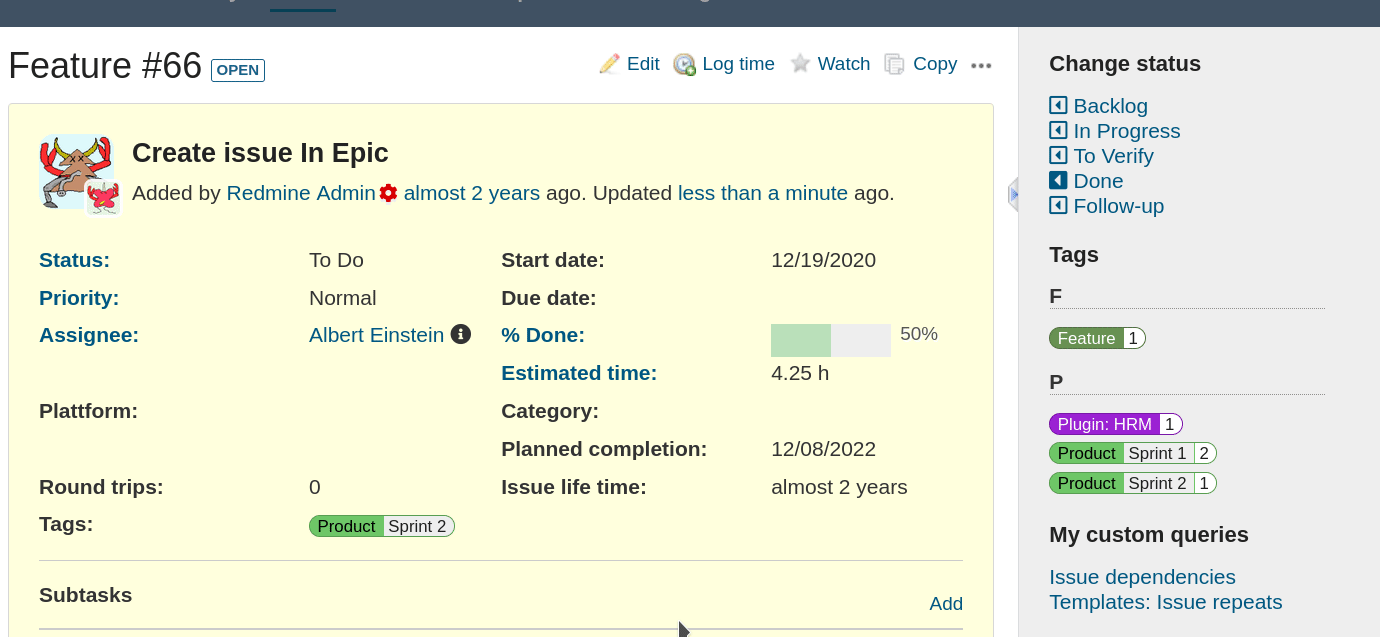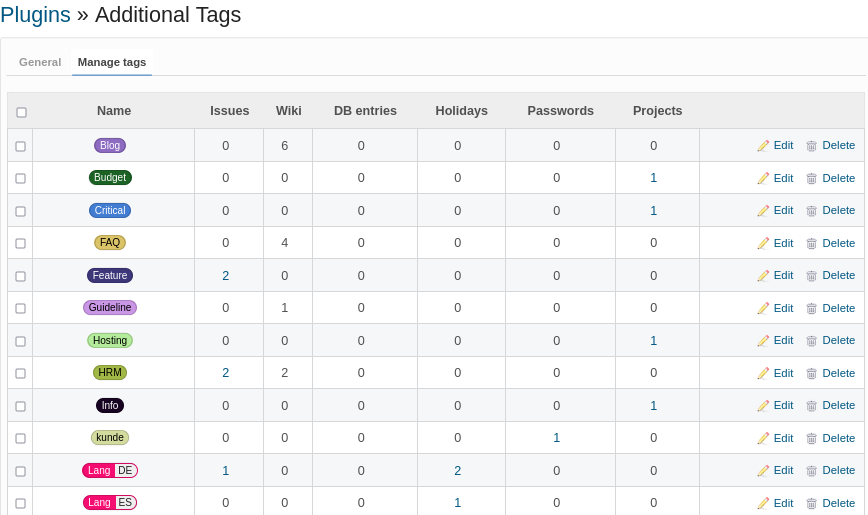- Tags for issues. To use them you need to:
- Activate issue tags in the plugin configuration
- and update your role permissions in the Redmine administration Roles & permissions / Issue tracking.
- Tags for wiki pages. To use them you need to:
- Activate wiki tags in the plugin configuration
- and update your role permissions in the Redmine administration Roles & permissions / Wiki
- Available role permissions for issue tags (section Issue tracking):
- Add issue tags
- Edit issue tags
- Display issue tags
- Available role permissions wiki tags (section Wiki):
- Add wiki tags
- Managing tags centrally in the plugin settings (edit, delete, merge)-
- Grouped tags.
- Grouping of tags possible, when using a colon in tag (all tags with same base name get the same color). Typo example:
Plugin:HRM
- Grouping of tags possible, when using a colon in tag (all tags with same base name get the same color). Typo example:
- Scoped tags:
- Grouping of tags via Scoped tags possible, when using two colons in tag. Typo example:
Product::Sprint 1 - Only one tag of the same base name is allowed for an entity
- Base name and tag value are displayed seperatly
- Grouping of tags via Scoped tags possible, when using two colons in tag. Typo example:
- Accented and non-latin characters supported for tag order
- Color theme selection possible
- Custom tags and tagging tables (additional_tags and additional_taggings). If another plugin used tags or tagging tables for issue or wiki tagging, tags will be migrated automatically there
- Based on the very popular acts-as-taggable-on
The screenshot shows: regular tags, grouped tags and scoped tags. The colors are assigned randomly. But you can change the color by choosing a Color theme in the plugin settings.
Other plugins use additional_tags as framework in order to support tags for their entities. At the moment this are:
- redmine_db (db entry tagging)
- redmine_passwords (password tagging)
- redmine_reporting (project tagging)
- redmine_hrm (holiday tagging)
- redmine_servicedesk (tagging of contact, canned responses, invoices, helpdesk issues)
- redmine_wiki_guide (wiki page tagging)
Start using it, too. The example image shows the centralized tag management in the plugin configuration.
- Main reason: a stable tag solution for a current Redmine version is needed - NOW
- Other plugins are no longer maintained or not available on a public community plattform as github or gitlab
- Redmine (core) does not support tags. A feature request for issue tags exists since 2008, see #1448.
- Lots of plugins are using its own tag implementation (redmine_knowledgebase, redmine_contacts, redmine_products, redmine_passwords, redmine_db, ....). A common functional base was required. This plugin closes this gap. It would be great, if other plugins would use
additional_tagsfor it.
- Redmine
>= 5.0 - Ruby
>= 3.1 - Redmine plugins: additionals
To install stable version of additional_tags, use
cd $REDMINE_ROOT
git clone -b stable https://www.github.com/alphanodes/additionals.git plugins/additionals
git clone -b stable https://www.github.com/alphanodes/additional_tags.git plugins/additional_tagsIf you want to use the latest development version, use
cd $REDMINE_ROOT
git clone https://github.com/alphanodes/additionals.git plugins/additionals
git clone https://github.com/alphanodes/additional_tags.git plugins/additional_tagsbundle config set --local without 'development test'
bundle install
bundle exec rake redmine:plugins:migrate RAILS_ENV=productionMake sure you have the latest database structure loaded to the test database:
bundle exec rake db:drop db:create db:migrate RAILS_ENV=testRun the following command to start tests:
bundle exec rake redmine:plugins:test NAME=additional_tags RAILS_ENV=testIf you use redmine_tags or redmineup_tags you can migrate your tags.
additional_tags uses its own database tables, to prevent conflicts with other plugins (e.g. redmine_knowledgebase, redmine_contacts, etc)
To migrate your data to additional_tags use the following steps (order is important):
- Remove plugin directory of your old plugin, e.g plugin/redmine_tags
- Install
additional_tagsas is descript above (this automatically migrate data to new tables)
The old database tables are existing after these steps.
cd $REDMINE_ROOT
bundle exec rake redmine:plugins:migrate NAME=additional_tags VERSION=0 RAILS_ENV=production
rm -rf plugins/additional_tagsThis plugin is licensed under the terms of GNU/GPL v2. See LICENSE for details.
The additional_tags is a plugin extension for Redmine Project Management Software, whose Copyright follows. Copyright (C) 2006- Jean-Philippe Lang
Redmine is a flexible project management web application written using Ruby on Rails framework. More details can be found in the doc directory or on the official website http://www.redmine.org
This program is free software; you can redistribute it and/or modify it under the terms of the GNU General Public License as published by the Free Software Foundation; either version 2 of the License, or (at your option) any later version.
This program is distributed in the hope that it will be useful, but WITHOUT ANY WARRANTY; without even the implied warranty of MERCHANTABILITY or FITNESS FOR A PARTICULAR PURPOSE. See the GNU General Public License for more details.
You should have received a copy of the GNU General Public License along with this program; if not, write to the Free Software Foundation, Inc., 51 Franklin Street, Fifth Floor, Boston, MA 02110-1301, USA.
The source code is a (almost) rewrite of
Special thanks to the original author and contributors for making this awesome hook for Redmine.
Thanks to:
- Font Awesome Free Icons (https://fontawesome.com/license/free) licenced under - Icons: CC BY 4.0, Fonts: SIL OFL 1.1, Code: MIT License. Copyright (c) 2018- Fonticons, Inc.
- Tabler Icons - Free and open source icons (https://tabler.io/icons) licensed under MIT License. Copyright (c) 2020- Paweł Kuna



